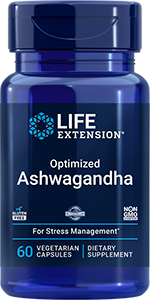
What Is the Best Form of Ashwagandha To Take?
Published: June 2025
Is your day-to-day grind wearing you down? Ashwagandha may be just what you need! This ancient herb is an adaptogen, which means it can help support a healthy stress response. People turn to ashwagandha supplements to help relieve the effects of everyday stress, but did you know ashwagandha can also help with quality sleep?
That's right! You can keep an even keel and get the rest your body needs with the right types of ashwagandha; there are different ones that have been clinically studied for these benefits, so you'll want to choose intentionally.
Here's what you need to know about this herb's health perks, how to choose the best ashwagandha supplement for your health needs, and tips to take it for optimal effectiveness.
What is ashwagandha?
Withania somnifera, aka ashwagandha, also goes by the names "Indian ginseng" and "winter cherry," although it's botanically unrelated to either ginseng or cherry. The adaptogenic herb has been used for centuries to support a healthy stress response. In ancient Ayurvedic practice, it was prized as a substance that helps strengthen the nervous system. Today, ashwagandha continues to be popular among people seeking calmness and mental well-being.
In the scientific community, different proprietary forms of ashwagandha have been studied for their health benefits, which come from the plant's withanolides. These are the primary active compounds that drive the herb's health-promoting benefits, which range from energy to stress management to help with sleep.
Why the variety? Different forms of ashwagandha contain different withanolide concentrations, just like different coffee roasts have varying caffeine levels. Lots of options are a good thing, of course, but it can make it difficult to choose. Not to worry, we're here to help!
What form of ashwagandha is most effective?
Ashwagandha's effectiveness depends on a lot of things (including whether you're following the instructions on the product label), but at the very least, you'll want to choose a product that has been studied for efficacy in clinical trials, and that the dosage in each capsule, tablet, etc. matches the dosage administered to the study subjects. (Don't take an influencer's word for it; demand to see the science!)
Two proprietary forms of ashwagandha with solid backing include:
Shoden® ashwagandha:
This is a good option if worries are making you toss and turn at night. In a randomized, double-blind, placebo-controlled clinical trial, participants taking Shoden® ashwagandha extract once daily for six weeks reported better sleep quality. Another study showed people taking Shoden® ashwagandha with 35% withanolide glycosides reported healthy morning serum cortisol and a calmer mood.
Sensoril® ashwagandha:
Research shows Sensoril® ashwagandha can help support a healthy stress response, as well as cognitive function and mood. In one study, well-being and general fatigue scores significantly improved (compared to the placebo groups, where no changes were observed).
So, which is better, Shoden® or Sensoril®? Consider whether it's more important to you to encourage restful sleep, in which case Shoden® is your ashwagandha of choice, or if the healthy stress response benefits seen with Sensoril® matter to you more.
Do your homework first and ensure the ingredients and dosages have been validated with research and that the product is produced by a reputable, high-quality brand.
Explore Our Best Stress Management Supplements
What to look for when choosing ashwagandha
In addition to studies demonstrating the product's efficacy, here are three traits to look for when shopping for ashwagandha supplements.
Bioavailability
Bioavailability means how easily your body can absorb and use a supplement. Look for supplements that use ashwagandha extract made from both root and leaf and have standardized active compounds.
Standardization of ingredients
You can find ashwagandha supplements in capsules, gummy or powder form. Capsules provide a standardized ashwagandha extract with a specific concentrated amount of withanolides, while ashwagandha in powder form has much less by weight. If you choose a powder, you'll need to take a lot more to get the same effect. Gummies may be easy to consume, but keep an eye out for ingredient levels and added sugar. In any form, you're better off with a standardized extract that's been clinically studied.
Certifications
Choose products with certifications like Good Manufacturing Practices (GMP) and third-party testing. These certifications mean the products follow strict guidelines and higher standards that ensure you choose pure, high-quality ingredients.
Does ashwagandha have side effects?
Ashwagandha is generally well-tolerated. However, everyone's biology is unique. You should always speak with your healthcare provider before starting any supplement or making a significant lifestyle change.
3 tips for taking ashwagandha
How you take your ashwagandha supplement can make all the difference between noticing results and tossing the bottle out in discouragement. Here are a few tips to optimize your results:
1. Know what time of day to take your supplement
Should you take your ashwagandha supplement in the morning or at night? It will depend on your health goal (and what the label says!).
- Sensoril® ashwagandha: Can be taken any time of day—it's designed for daily stress support and balance.
- Shoden® ashwagandha: This is best taken before bedtime. You can also find ashwagandha with melatonin if you're looking for an extra "oomph" from a sleep support supplement. If melatonin is not your bedtime "jam," you can opt to look for ashwagandha with black cumin extract to help support sleep latency, duration and efficacy.
Pro tip: You can alternate between ashwagandha supplements to target different health goals.
2. Should you take it with food?
Again, always check the label. The instructions will tell you whether to take your supplement with food or not.
- Sensoril® capsules should generally be taken on an empty stomach.
- Shoden® can be taken with or without food, offering a little more flexibility in how you can take it.
3. Consistency is key
As with any supplement, it's important to stay patient and have a routine. The benefits of a supplement build up over time, so you'll see better results when you take your supplement daily. Worried you might forget? Set an alarm as a reminder and store the bottle somewhere you can see it.
How long before I notice a difference?
For optimal results, it's best to follow the timelines used in clinical studies. Research suggests effects can be seen within six to eight weeks of consistent use of ashwagandha for either sleep support or stress management. But everyone is different and depending on your body's unique biochemistry, you may see changes before this timeline or after it.
Of course, whether you're looking to support stress or sleep, leading a wellness-focused lifestyle is a must. So, prioritize nutrient-rich meals and regular exercise to promote quality sleep and a healthy stress response. A dietary supplement should complement the little things you do daily to support your overall health, not replace them.
Pro tip: Take a quick quiz and get personalized suggestions on supplements that help manage stress and support a healthy mood.
About the Author: April Benshosan holds a master's degree in publishing and has been reporting on nutrition, fitness, and health for nearly a decade. Her work has been published in both print and digital outlets, including Women’s Health, EatingWell, SHAPE and more.
References
- Auddy B, et al. "A Standardized Withania Somnifera Extract Significantly Reduces Stress-Related Parameters in Chronically Stressed Humans: A Double-Blind, Randomized, Placebo-Controlled Study." Journal of American Nutraceutical Association. November 2008. https://www.researchgate.net/publication/242151370_A_Standardized_Withania_Somnifera_Extract_Significantly_Reduces_Stress-Related_Parameters_in_Chronically_Stressed_Humans_A_Double-Blind_Randomized_Placebo-Controlled_Study
- Deshpande A, et al. "A randomized, double blind, placebo controlled study to evaluate the effects of ashwagandha (Withania somnifera) extract on sleep quality in healthy adults." Sleep Med. August 2020. https://pubmed.ncbi.nlm.nih.gov/32540634/
- Kumar M, et al. In vitro Plant Breeding towards Novel Agronomic Traits. Springer Nature. 2019. https://link.springer.com/book/10.1007/978-981-32-9824-8
- Mikulska P, et al. "Ashwagandha (Withania somnifera)-Current Research on the Health-Promoting Activities: A Narrative Review." Pharmaceutics. March 2023. https://pubmed.ncbi.nlm.nih.gov/37111543/
- Mishra DN, Kumar M. "Shoden promotes Relief from stress and anxiety: A randomized, double-blind, placebo-controlled study on healthy subjects with high stress levels." Heliyon. September 2024. https://www.sciencedirect.com/science/article/pii/S2405844024129167
- Pandit S, et al. "Effects of Withania somnifera Extract in Chronically Stressed Adults: A Randomized Controlled Trial." Nutrients. April 2024. https://pubmed.ncbi.nlm.nih.gov/38732539/
- Saleem S, et al. "Withania somnifera L.: Insights into the phytochemical profile, therapeutic potential, clinical trials, and future prospective." Iran J Basic Med Sci. December 2020. https://pmc.ncbi.nlm.nih.gov/articles/PMC7811807/
Like what you read?
Please subscribe to get email updates on this blog.











